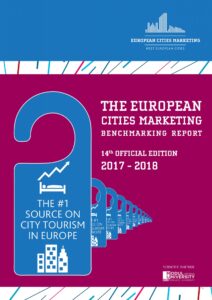European Cities Marketing Benchmarking Report 2018 shows the continuous growth of European city tourism
The 14th edition of the European Cities Marketing Benchmarking Report includes key figures from 126 European cities and provides benchmarking insight into bednights sourced from Europe’s main markets in addition to analyses of city tourism compared to national tourism, bed supply, occupancy, and tourism densities.

Overall, the ECM report states that the cities included in the report achieved an average growth rate of 7.4% in the past report period of 2016-2017. International bednights grew 7.6% whereas domestic bednights increased 4.8% during the same period. The growth in the international bednights is a result of the increase in the main source markets, specifically Russia (+26.7%), China (+16.5%), and the United States (+15.5%).
Top Performing Cities
The growth in terms of bednights is also related to the growth rate of top performing cities. Of these top performing cities, three of them (Amsterdam, Istanbul, and Munich) showed an increase of more than 10%, followed by Lisbon (+9.8%) and Paris (+9.3%).
Table 1. Top 15 European Cities – Total Bednights 2017
| Destination | Total Bednights 2017 | 2016-17% change | |
| 1 | London* | 79,867,355 | 4.7% |
| 2 | Paris* | 48,110,071 | 9.3% |
| 3 | Berlin | 31,143,424 | 0.2% |
| 4 | Rome* | 29,293,952 | 2.4% |
| 5 | Madrid* | 19,263,602 | 6.4% |
| 6 | Barcelona* | 18,791,180 | -1.9% |
| 7 | Prague | 18,055,838 | 7.5% |
| 8 | Istanbul | 17,256,265 | 12.4% |
| 9 | Vienna* | 16,423,533 | 4.2% |
| 10 | Amsterdam* | 15,857,000 | 13.4% |
| 11 | Munich* | 15,663,728 | 11.7% |
| 12 | Stockholm* | 14,048,353 | 4.5% |
| 13 | Hamburg | 13,822,337 | 3.7% |
| 14 | Milan | 11,853,191 | 8.0% |
| 15 | Lisbon* | 10,667,695 | 9.8% |
*Refer to cities with different definitions and data rectifications.
Source: European Cities Marketing Benchmarking Report 2018
Dieter Hardt-Stremayr, European Cities Marketing President, says: “The past five years have shown a positive average annual growth rate of bednights in both the ECM report’s cities (+7.5%) as well as among the EU28 nations (+4.7%). European cities have continued to demonstrate faster growth rates than EU28 nations, which once again proves the importance of city tourism. This 14th edition of the ECM Benchmarking Report provides a vital perspective on the volume of urban tourism in Europe, enabling individual city destinations to chart trends and to benchmark themselves in terms of volume and other parameters, especially key source markets. It presents compelling evidence of the economic significance of contemporary urban tourism. Cities are the dominant geographical focus of European tourism, especially the lucrative (and therefore much sought after!) short break and congress and/or convention‘s segments.”
The main factors that influence tourism demand in Europe include increasing volatility within the past years, political and economic crisis (including Post-Crisis Year developments), airline connectivity, and economic recovery in the long-haul markets, such as Japan. Moreover, recent developments in tariffs, also known as the trade war between the US, China, and Europe, can also influence the future of travel in the world, since they are expected to affect the world economy.
Produced by MODUL University Vienna, the European Cities Marketing Benchmarking Report provides the #1 source of city tourism statistics in Europe. ECM reports twice a year about the current state of the tourism industry. In March, the organisation provides first preliminary results and trends about the previous year, in July the ECM Benchmarking Report is presented containing detailed analyses and benchmarks of the past 5 years, as well as the forecast for the current year. For the 14th edition, European Cities Marketing (ECM) presented the ECM Benchmarking Report 2018 during its International Conference in Malmö. The report not only covers statistics portraying tourism development for 126 European cities but also forms the basis for discussing major trends and developments in Europe among the member cities.
The report costs €990 with the full dataset of figures, and is free for members of European Cities Marketing. The report can be ordered from http://www.europeancitiesmarketing.com/ecm-benchmarking-report.
To be up to date with these latest figures, please get in touch with European Cities Marketing and subscribe to the regular press releases.
**ENDS**
*European Cities Marketing is a non-profit organisation improving the competitiveness and performance of leading cities of Europe by providing a platform for convention, leisure and city marketing professionals to exchange knowledge, best practice and widen their network to build new business. European Cities Marketing is promoting and linking the interests of members from more than 110 major cities in 38 countries.
Further information
www.europeancitiesmarketing.com/ecm-benchmarking-report
Enquiries
European Cities Marketing, Flavie Baudot, press@europeancitiesmarketing.com, +33 380 56 02 00
MODUL University Vienna (Scientific Partner), Karl Wöber, karl.woeber@modul.ac.at, +43 1 3203555-300